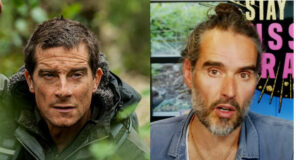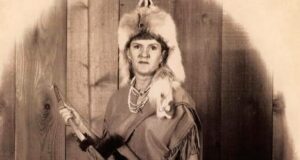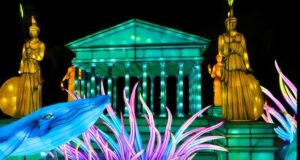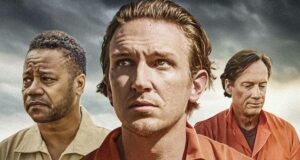For J.R.R. Tolkien, life began as a child running through hill and heather with a stick in his hand, filling his world with knights and dragons and forgotten quests.
For Tolkien, this is where the fire for his epic books began: Sarehole Mill was home, and that meant comfort.
But as Tolkien the writer would later emphasize, every great story needs its share of trials — a departure from home and into the wilds. “Boys, we are going to face some difficult times,” his mother, Mabel, warns Tolkien and his younger brother Hilary. And she was right.
The movie will both delight and disappoint fans and newcomers. Starring Nicholas Hoult, Lily Collins, Colm Meaney, and Derek Jacobi, the film has been questioned for not exploring Tolkien’s faith in more depth. While documentaries have done that, and his books clearly indicate a deep faith, this biopic chose to look at familial relationships and the bonds of friendship that informed his view of loyalty and life.
Tolkien’s father had died years before. Mabel needs to find work to support her small family. And so the Tolkiens move away from the Shire-like lands around Sarehole Mill and into the dirty heart of Birmingham. Soon after, Mabel dies too. The two orphan boys are foisted into the protective custody of Father Francis and the Catholic Church.
Father Francis finds the lads a home — or, at least, boarding — with the kindly widow Mrs. Faulkner. Tolkien is sent to a top-notch prep school and becomes friends with schoolmates who hail from far more comfortable circumstances. Soon, the four chums form a fellowship of sorts: the Tea Club and Barrovian Society, they call it the TCBS for short. And even as their parents push them toward more practical careers, they swear to change the world through art: Poetry. Painting. Music. Writing.
But another relationship pulls at Tolkien, too. Edith Bratt is a fellow orphan, a fellow boarder at Mrs. Faulkner’s home, and a fellow artist — a pianist with a love of Wagner. She’s beautiful, too. Almost elvish.
But as Tolkien grows in stature and spirit, dark clouds gather at the edges of his life. He’s still a poor orphan, his schooling entirely dependent on scholarships and the generosity of the Catholic Church. The always-squabbling countries of Europe edge ever closer to what could be a cataclysmic war. Edith feels the pressure around them, too — a pair of poor, would-be soulmates in a time when only wealth could reliably open doors.
“I let myself believe that there are happy endings for people like us,” she tells Tolkien. “But there aren’t. There can’t be.”
But Tolkien believes there just might be yet — if they’re willing to carry the necessary burdens and embark on the necessary quest. Peril is a part of the process, after all.
Becausse as Tolkien would later say, “A safe fairyland is untrue to all worlds.”
J.R.R. Tolkien doesn’t exactly come across as an epic, self-sacrificial Frodo in this biopic. His heroism is a bit more understated here. His core virtue in the film — much like Frodo’s, really — is his tenacity. He seems to commit emotionally to Edith for life quite early, even as their budding relationship runs into loads of challenges. And his love for languages — even the ones he makes up — requires sacrifice, too. Initially a classics major at Oxford University, he has to prove to the school’s intimidating philology (language) professor that he’s worthy of switching majors and finding a seat in the professor’s already over-stuffed department.
In some respects, the people around Tolkien are the real heroes here. His mother helps build a love of story in Tolkien. His prep-school comrades, all of whom come from wealthier, more secure backgrounds, take him in and make him their kindred brother. And Edith helps Tolkien (who’s already experimenting with made-up languages by this time) see the real power of words.
“Things aren’t beautiful because of how they sound,” she tells him. “They’re beautiful because of what they mean.” This revelation moves Tolkien from merely relishing how his words float off the tongue toward imagining (eventually) the fantastic stories they’d help form.
Finally, during World War I, a soldier (suggestively named Sam) cares for and protects Tolkien as well as can possibly be expected.
I wonder what the real J.R.R. Tolkien would’ve thought of this movie. While director Dome Karukoski expressed hope in an interview that, one day, he can sit on a cloud with the author and talk about it, Tolkien was notoriously adverse to people using lenses outside a given story to view said story. He never liked it when his friend C.S. Lewis used obvious allegory in his own fantasy series (The Chronicles of Narnia), and he was discomfited by efforts to interpret his own books as analogous to, say, the horrors of World War II or fascism or industrialism. He thought the story should always stand on its own.
“I cordially dislike allegory in all its manifestations, and always have done so since I grew old and wary enough to detect its presence,” he wrote in a forward to The Fellowship of the Ring. “I much prefer history — true or feigned — with its varied applicability to the thought and experience of readers. I think that many confuse applicability with allegory, but the one resides in the freedom of the reader, and the other in the purposed domination of the author.”
Still, as a Tolkien fan, it’s interesting to see where Tolkien might’ve drawn inspiration for his stories: The bucolic green hills of Sarehole Mill become the Shire, his school friends as the first manifestation of a do-or-die Fellowship, the horrors of the Somme echoing the bleached, barren lands of Mordor.
Tolkien is a fine, watchable biopic that, content-wise, strays from the straight-and-narrow at times but not too badly.
Fans of Tolkien and his work will not be disappointed at this view of the man behind the stories.
 Metro Voice News Celebrating Faith, Family & Community
Metro Voice News Celebrating Faith, Family & Community












